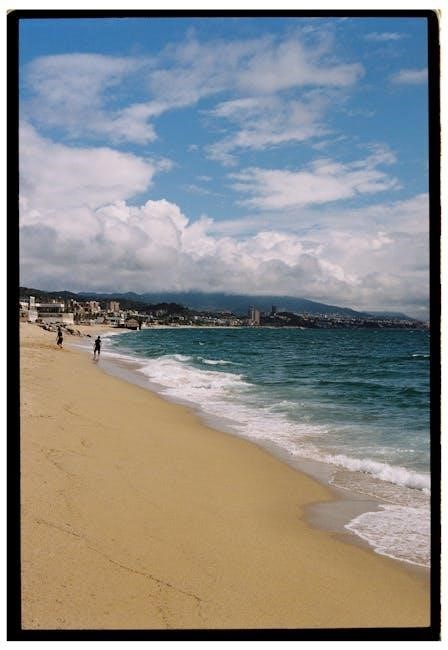poet who was guided through paradise crossword clue
The crossword clue “Poet who was guided through Paradise” points to Dante Alighieri, author of The Divine Comedy. Guided by Beatrice, Dante navigates Paradise in the poem.
Overview of the Crossword Clue
The crossword clue “Poet who was guided through Paradise” refers to Dante Alighieri, the renowned Italian poet. In The Divine Comedy, Dante is guided through Paradise by Beatrice, a central figure symbolizing divine love and wisdom. This clue highlights Dante’s iconic journey, exploring themes of redemption, divine justice, and spiritual enlightenment. The answer, “DANTE,” is a common solution in crossword puzzles, reflecting the poet’s enduring legacy in literature. The clue underscores the significance of Beatrice as Dante’s guide, emphasizing her role in his spiritual ascent. This crosswords reference remains popular due to its historical and cultural relevance.
Importance of Understanding the Clue
Understanding the crossword clue “Poet who was guided through Paradise” is crucial for appreciating its literary and historical significance. Dante Alighieri, guided by Beatrice, embodies themes of divine love and redemption in The Divine Comedy. Recognizing this connection highlights the poem’s enduring influence on literature and culture. The clue not only tests knowledge of Dante’s work but also underscores Beatrice’s symbolic role as a guide, reflecting deeper spiritual and philosophical concepts. Grasping this clue enriches one’s understanding of classical literature and its lasting impact on modern thought and crossword puzzles. It bridges historical context with contemporary problem-solving.
Relevance of Dante in Literary History
Dante Alighieri stands as a cornerstone of world literature, particularly through his masterpiece, The Divine Comedy. This epic poem, divided into Inferno, Purgatorio, and Paradiso, showcases Dante’s profound influence on literary themes, language, and structure. His innovative use of the Tuscan dialect helped establish Italian as a literary language, setting a precedent for future writers. The poem’s exploration of moral, philosophical, and theological themes continues to resonate, making Dante a pivotal figure in literary history. His work has inspired countless authors, artists, and thinkers, cementing his legacy as one of the greatest poets of all time. His impact remains unparalleled in literary circles.
Dante Alighieri: The Poet
Dante Alighieri, renowned for The Divine Comedy, is celebrated as a literary icon. His poetic mastery, guided by themes of divine love and redemption, shaped Italian literature profoundly.
Biography of Dante Alighieri
Dante Alighieri, born in Florence in 1265, was a renowned Italian poet and philosopher. His life was marked by political turmoil and exile, which deeply influenced his writing. Dante’s early years were spent in a noble family, and he developed a passion for poetry and philosophy. His exile from Florence in 1302 shaped his masterpiece, The Divine Comedy, where he explored themes of redemption and divine justice. Dante passed away in 1321 in Ravenna, leaving behind a legacy that transformed Italian literature and cemented his place as one of history’s greatest poets.
Dante’s Role in the Divine Comedy
Dante Alighieri is both the author and the protagonist of The Divine Comedy, a three-part epic poem. As the protagonist, Dante embarks on a spiritual journey through Hell, Purgatory, and Paradise, guided by the Roman poet Virgil and later by Beatrice. His role as the pilgrim allows him to explore themes of sin, redemption, and divine love. Through this narrative, Dante expresses his theological and philosophical views, blending personal experiences with universal truths. His dual role as writer and character underscores the poem’s autobiographical depth and its enduring relevance in literature and spirituality.
Significance of Dante’s Works in Literature
Dante Alighieri’s works, particularly The Divine Comedy, hold immense significance in literature. His masterpiece is considered one of the greatest works of Italian literature and a cornerstone of the Western canon. Dante’s innovative use of the vernacular Italian language helped establish it as a literary medium, influencing countless writers. The poem’s intricate structure, allegorical depth, and exploration of universal themes like love, redemption, and divine justice have made it a timeless classic. Its impact extends beyond literature, shaping art, theology, and culture. Dante’s vision of Paradise, Purgatory, and Hell remains a profound exploration of the human condition, continuing to inspire scholars and readers alike.
Beatrice: The Guide Through Paradise
Beatrice is Dante’s guide in Paradise, symbolizing divine love and wisdom. She leads him through the celestial realms, embodying the ideal of spiritual and intellectual enlightenment.
Who Is Beatrice in Dante’s Divine Comedy?
Beatrice Portinari, Dante’s idealized love, is a central figure in The Divine Comedy. She guides Dante through Paradise, symbolizing divine grace and enlightenment. Her presence represents spiritual growth and redemption.
Beatrice’s Role in Guiding Dante
Beatrice plays a pivotal role as Dante’s guide through Paradise in The Divine Comedy. She embodies divine wisdom, leading him through the realms of Heaven, explaining theological concepts and divine justice. Her guidance symbolizes the redemptive power of love, ensuring Dante’s spiritual enlightenment and understanding of the divine order. Through Beatrice, Dante conveys the transformative impact of love and faith on the human soul.
Symbolism of Beatrice in the Divine Comedy
Beatrice symbolizes divine love, grace, and enlightenment in The Divine Comedy. As Dante’s guide through Paradise, she embodies the redemptive power of love and faith, representing a bridge between Earth and Heaven. Her presence signifies purity, wisdom, and spiritual illumination, guiding Dante toward divine truth and understanding. Beatrice’s character transcends human love, becoming a celestial figure who embodies God’s divine plan and mercy. Through her, Dante conveys the transformative impact of divine grace on the human soul, making her a central symbolic figure in the narrative of his spiritual journey.

The Divine Comedy: Structure and Themes
Dante’s masterpiece is divided into three cantiche: Inferno, Purgatorio, and Paradiso. It explores themes of sin, repentance, and divine grace, using allegory to depict spiritual journeys.
Overview of the Divine Comedy
The Divine Comedy, written by Dante Alighieri, is an epic poem divided into three parts: Inferno, Purgatorio, and Paradiso. It chronicles Dante’s allegorical journey through Hell, Purgatory, and Paradise, guided by the Roman poet Virgil and later by Beatrice. The poem explores themes of sin, redemption, and divine love, blending theology, philosophy, and classical references. It is considered one of the greatest works of Italian literature, offering profound insights into the human condition and spiritual aspirations. The Divine Comedy’s intricate structure and rich symbolism have made it a timeless masterpiece, influencing art and literature for centuries.
Structure of Paradise in the Divine Comedy
In the Divine Comedy, Paradise is divided into nine celestial spheres, reflecting a hierarchical order of divine grace. Dante, guided by Beatrice, ascends through these realms, encountering blessed souls who embody virtue and divine love. The structure symbolizes the harmony of God’s creation, with each sphere representing a higher level of spiritual enlightenment. The journey culminates in the Empyrean, the highest realm, where Dante experiences a mystical union with God. This intricate structure underscores Dante’s vision of Paradise as a place of perfect order, beauty, and divine light, where souls are aligned with God’s will and eternal bliss.
Themes Explored in Dante’s Paradise
Dante’s Paradise explores themes of divine love, redemption, and the harmony of creation. Through his ascent, Dante contemplates the nature of divine justice, the role of free will, and the ultimate union with God. The realm of Paradise symbolizes the triumph of good over evil, with blessed souls exemplifying virtues and divine grace. Love, both human and divine, is central, as Beatrice guides Dante, embodying idealized love. The poem also delves into moral and philosophical truths, offering insights into the human condition and the path to spiritual enlightenment, making it a profound exploration of faith, morality, and eternal bliss.
Paradise in Dante’s Vision
Dante’s Paradise represents a realm of divine love and spiritual ascent, guided by Beatrice, where souls attain eternal bliss through divine grace and perfect harmony.
Dante’s Concept of Paradise
Dante’s concept of Paradise, as depicted in The Divine Comedy, is a realm of divine love and spiritual ascent. Structured into nine celestial spheres, it reflects ascending levels of divine grace. Guided by Beatrice, Dante experiences a harmonious unity with God, where souls achieve eternal bliss through divine light and love. This vision emphasizes spiritual purification and the ultimate union with the divine, showcasing Paradise as a place of perfect joy and enlightenment.
The Journey Through the Nine Spheres
Dante’s journey through Paradise unfolds across nine celestial spheres, each representing a higher level of divine grace and understanding. Guided by Beatrice, Dante ascends from the Moon to the Empyrean, encountering blessed souls who embody virtues and divine love. The spheres are associated with planets and celestial bodies, symbolizing harmony and order. In the higher realms, Dante experiences profound spiritual enlightenment, culminating in a vision of God in the Empyrean. This structured ascent reflects Dante’s theological vision of Paradise as a realm of progressive purification and union with the divine, emphasizing the transformative power of love and grace.
The Empyrean: The Highest Level of Paradise
The Empyrean is the pinnacle of Dante’s Paradise, a realm of pure light where the blessed experience divine union with God. Beyond the nine celestial spheres, it is the abode of the Trinity and the saints. Here, Dante encounters the River of Light and the celestial rose, symbols of divine wisdom and joy. Beatrice leads him to this ultimate realm, where he achieves spiritual fulfillment. The Empyrean represents the culmination of Dante’s journey, where love and understanding merge with the divine, embodying the highest aspirations of the human soul in Dante’s vision of eternal bliss and perfect harmony.

Crossword Clue: Poet Guided Through Paradise
The clue “Poet guided through Paradise by Beatrice” leads to DANTE, the renowned Italian poet of The Divine Comedy, where he journeys through Paradise.
Analysis of the Crossword Clue
The crossword clue “Poet guided through Paradise by Beatrice” is a direct reference to Dante Alighieri, the Italian poet of The Divine Comedy. The clue combines historical and literary elements, pointing to Dante’s journey through the realms of the afterlife. Beatrice, a central figure in the poem, serves as Dante’s guide in Paradise, symbolizing divine love and wisdom. This clue requires knowledge of classical literature and the ability to connect the poet with his most famous work. The answer, DANTE, is concise and fits the typical structure of crossword puzzles, making it an effective clue for literary enthusiasts.
Identifying the Poet: Dante Alighieri
Dante Alighieri, the renowned Italian poet, is the figure referenced in the crossword clue. As the author of The Divine Comedy, Dante is famously guided through Paradise by Beatrice, a character symbolizing divine love. The clue aligns with Dante’s journey, highlighting his prominence in literary history. The structure of the clue, pointing to Dante’s name, makes it a straightforward yet insightful question for crossword enthusiasts. Dante’s role in The Divine Comedy solidifies his identity as the poet in question, connecting historical and cultural significance to the puzzle.
Confirming the Answer: DANTE
The crossword clue “Poet guided through Paradise” unambiguously points to Dante Alighieri. As the author of The Divine Comedy, Dante’s journey through Paradise, guided by Beatrice, is central to the narrative. Crossword solutions consistently confirm “DANTE” as the answer, aligning with his historical and literary significance. The five-letter structure of the clue matches Dante’s name perfectly, further solidifying it as the correct response. This confirmation underscores Dante’s enduring impact on literature and his role as a cultural icon, making “DANTE” the definitive answer for this crossword puzzle.

Historical and Cultural Impact
Dante’s Divine Comedy is a cornerstone of Italian literature, influencing countless writers. His depiction of Paradise has inspired art, philosophy, and cultural movements for centuries.
Dante’s Influence on Literature
Dante Alighieri’s Divine Comedy has profoundly shaped literature, inspiring poets and writers across centuries. His vivid imagery and allegorical themes influenced masterpieces from Milton’s Paradise Lost to T.S. Eliot’s works. Dante’s use of the vernacular Italian language democratized literature, making it accessible beyond Latin. His exploration of themes like divine justice and redemption resonated deeply, creating a lasting legacy. Many authors have drawn parallels with Dante’s journey, reflecting his enduring impact on literary traditions and modern storytelling. His work remains a cornerstone of literary studies, continuing to inspire new generations of writers and scholars.
Cultural Significance of the Divine Comedy
The Divine Comedy holds immense cultural significance as a masterpiece of Italian literature, shaping the nation’s identity and language. Dante’s work introduced the Tuscan dialect, laying the foundation for modern Italian. Its themes of love, redemption, and divine justice resonate universally, influencing art, literature, and philosophy. The poem’s vivid depictions of Hell, Purgatory, and Paradise have inspired countless artistic adaptations, from Botticelli’s illustrations to contemporary media. As a cultural icon, it bridges medieval and modern thought, reflecting human aspirations and moral struggles. Its enduring relevance ensures its continued study and appreciation, solidifying its place in the cultural heritage of the world.
Beatrice’s Legacy in Art and Literature
Beatrice, Dante’s guide through Paradise, has left an indelible mark on art and literature. Her portrayal as a divine guide and symbol of pure love has inspired generations of artists and writers; In literature, she represents the ideal of romantic and spiritual devotion, influencing works beyond Dante’s era. In art, Beatrice has been depicted by masters like Sandro Botticelli and William Blake, embodying grace and enlightenment. Her legacy extends into modern culture, where she remains a powerful symbol of inspiration and transcendence, continuing to captivate audiences with her timeless elegance and profound spiritual significance.

Beatrice as a Literary Guide
Beatrice serves as Dante’s spiritual guide through Paradise, embodying divine love and enlightenment. Her role transcends literature, becoming a timeless symbol of inspiration and moral direction.
Beatrice’s Character in the Divine Comedy
Beatrice is portrayed as a divine figure in The Divine Comedy, representing pure love and moral guidance. She appears as Dante’s idealized beloved, leading him through Paradise with grace and wisdom. Her character symbolizes divine grace and enlightenment, serving as a moral compass for Dante’s spiritual journey. Beatrice’s presence is pivotal in Paradiso, guiding Dante through the celestial realms and offering profound insights into divine truths. Her interactions with Dante reflect a deep emotional and spiritual connection, making her one of the most enduring and influential female figures in literary history. Beatrice’s character encapsulates the essence of divine love and guidance.
Beatrice’s Role in Dante’s Spiritual Journey
Beatrice plays a pivotal role in Dante’s spiritual journey, serving as his divine guide through Paradise. She embodies divine grace and enlightenment, leading Dante upward from the Earthly Paradise to the highest realms of Heaven. Beatrice’s guidance is both intellectual and emotional, helping Dante ascend through the spheres of Paradise and understand divine truths. Her presence symbolizes redemption and divine love, enabling Dante to transcend earthly concerns and achieve spiritual enlightenment. Through her, Dante gains insight into the nature of God and the universe, culminating in his ultimate union with the divine. Beatrice’s role is central to Dante’s spiritual transformation and enlightenment.
Beatrice’s Symbolism in Modern Literature
Beatrice’s figure in modern literature symbolizes divine love, grace, and intellectual awakening. She is often portrayed as an idealized muse, embodying the divine feminine and moral guidance. In contemporary works, Beatrice represents the transformative power of love and spirituality, inspiring themes of redemption and divine justice. Her character transcends the medieval context, becoming a universal symbol of enlightenment and spiritual aspiration. Modern authors draw on her imagery to explore themes of love, morality, and the divine, ensuring her enduring relevance in literature and art. Beatrice’s legacy continues to inspire, making her a timeless and powerful symbolic figure in modern storytelling and thought.

Dante’s Journey Through Hell, Purgatory, and Paradise
Dante’s journey through Hell, Purgatory, and Paradise, guided by Virgil and Beatrice, explores sin, redemption, and divine justice, culminating in the Empyrean, symbolizing ultimate spiritual enlightenment.
Overview of Dante’s Journey
Dante’s journey through Hell, Purgatory, and Paradise is a profound allegorical pilgrimage, guided by Virgil in the early realms and Beatrice in Paradise. The journey begins on Good Friday, as Dante, lost in a dark forest, is met by Virgil, who leads him through Hell and Purgatory. Upon reaching the Earthly Paradise, Beatrice takes over, guiding Dante upward through the celestial spheres of Paradise. This transformative voyage explores themes of sin, redemption, and divine justice, ultimately leading Dante to a vision of God in the Empyrean. The journey reflects Dante’s quest for spiritual enlightenment and understanding of divine love.
Guides in Each Realm: Virgil and Beatrice
In Dante’s journey, Virgil and Beatrice serve as guides, each representing different aspects of his spiritual pilgrimage. Virgil, the embodiment of reason and human wisdom, leads Dante through Hell and Purgatory, offering insights into sin and redemption. Beatrice, symbolizing divine love and grace, guides Dante through Paradise, enlightening him about divine truth and eternal bliss. Their roles transition seamlessly, with Virgil departing at the Earthly Paradise, where Beatrice assumes her role. Together, they symbolize the fusion of human intellect and divine inspiration, facilitating Dante’s ascent toward spiritual enlightenment and union with God. Their guidance underscores the dual nature of Dante’s journey: earthly and heavenly wisdom intertwined.
Significance of the Journey Through Paradise
Dante’s journey through Paradise, guided by Beatrice, signifies his spiritual ascension and union with the divine. It represents the culmination of his pilgrimage, where he transcends earthly limitations and experiences divine love. The journey highlights the triumph of grace and redemption, as Dante encounters blessed souls and gains profound insights into God’s nature. The structured realms of Paradise, from the Moon to the Empyrean, symbolize a hierarchical universe governed by divine order. This ascent not only reflects Dante’s personal salvation but also embodies universal themes of divine justice, love, and the ultimate harmony of creation, making it a cornerstone of Christian allegory and literary brilliance.
Themes and Symbolism in the Divine Comedy
The Divine Comedy explores themes of divine justice, love, and redemption, with symbols like light representing divine grace and purification, enriching the allegorical narrative.
Themes of Love, Redemption, and Divine Justice
Dante’s Divine Comedy intricately weaves themes of love, redemption, and divine justice. Love, personified by Beatrice, serves as Dante’s spiritual guide, symbolizing divine grace. Redemption is central, as Dante’s journey through Hell, Purgatory, and Paradise represents personal and moral purification. Divine justice is reflected in the moral structure of the afterlife, where souls face consequences for their actions. These themes intersect to provide a profound exploration of human morality, divine forgiveness, and the transformative power of love, shaping the spiritual and philosophical core of Dante’s masterpiece, offering timeless insights into human nature and divine order.
Symbolism of Light and Darkness in Paradise
In Dante’s Paradise, light symbolizes divine grace, purity, and enlightenment, while darkness represents sin and spiritual separation. Beatrice, Dante’s guide, embodies light, reflecting divine love and wisdom. As Dante ascends through the realms of Paradise, the intensity of light increases, signifying proximity to God. Conversely, darkness in the lower realms, like Hell, underscores the absence of divine light. This contrast reinforces the spiritual journey from darkness to illumination, highlighting the transformative power of divine grace and the soul’s progression toward eternal light. The interplay of light and darkness enriches the narrative, visually and metaphorically guiding Dante—and readers—toward divine truth.
Allegorical Representations in Dante’s Work
Dante’s Divine Comedy is rich in allegorical representations, where characters, events, and settings symbolize deeper spiritual and moral truths. Beatrice, for instance, embodies divine love and wisdom, guiding Dante toward enlightenment. Similarly, the three realms—Hell, Purgatory, and Paradise—represent the states of sin, purification, and divine union. The ascent through Paradise mirrors the soul’s journey toward God, while the celestial hierarchy reflects the order of divine grace. Dante’s use of light and darkness further underscores moral duality, with light symbolizing divine truth and darkness representing sin. These allegorical elements transform the narrative into a profound exploration of human redemption and divine love.
The crossword clue identifies Dante as the poet guided through Paradise by Beatrice, highlighting his enduring influence in literature and cultural heritage.
The crossword clue “Poet who was guided through Paradise” directly references Dante Alighieri, the renowned Italian poet. The answer, DANTE, is a 5-letter word that fits the clue perfectly. This clue highlights Dante’s journey through Paradise in The Divine Comedy, guided by Beatrice, a central figure in the poem. The clue is straightforward, requiring knowledge of literary classics, particularly Dante’s iconic work. It underscores the significance of Dante and Beatrice’s roles in literature, making it a popular reference in crossword puzzles. This clue not only tests literary knowledge but also celebrates Dante’s enduring influence on world literature.
Final Thoughts on Dante and Beatrice
The poet guided through paradise by Beatrice is Dante Alighieri. The answer to the crossword clue is DANTE. This refers to Dante’s journey in “The Divine Comedy,” where Beatrice leads him through the realms of Heaven. The 5-letter name DANTE fits the clue perfectly, and Beatrice’s role as his guide is a central theme in the poem. Dante’s association with Beatrice is unique and significant, making him the correct answer.
Importance of the Divine Comedy in Modern Times
Dante’s Divine Comedy remains a cornerstone of literature, influencing art, culture, and education. Its exploration of universal themes like love, redemption, and divine justice continues to resonate. The poem’s intricate structure and symbolic depth inspire modern interpretations, while its historical significance ensures its relevance in academic studies. The crossword clue “Poet guided through Paradise” reflects its enduring popularity, making Dante a timeless figure. This work not only shaped medieval thought but also continues to inspire contemporary creativity, proving its lasting impact on global culture and literature. Its themes of hope and divine grace remain universally relatable, ensuring its continued study and admiration.
